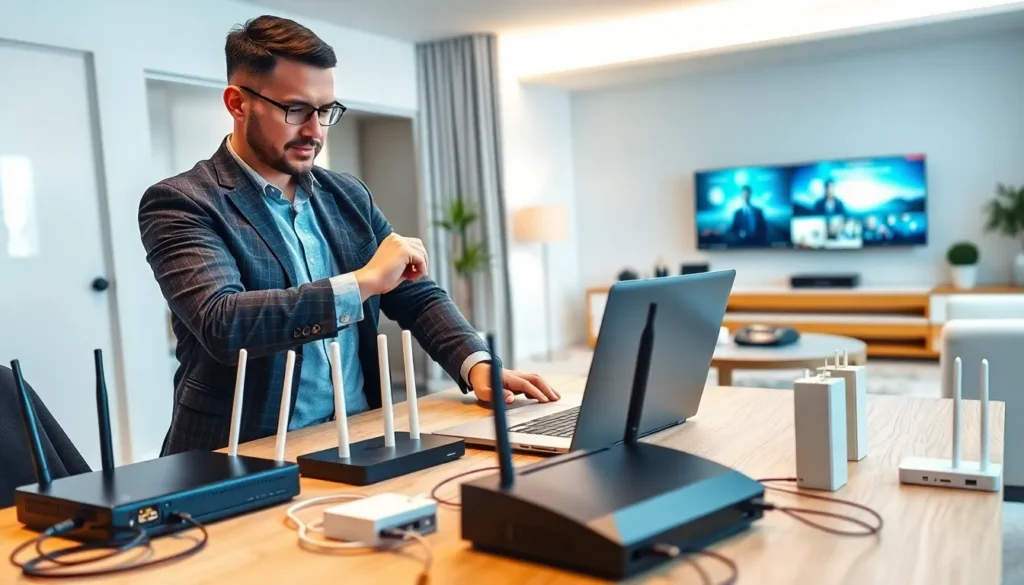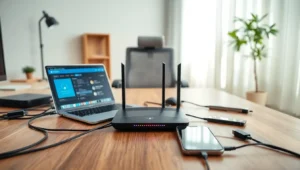Imagine this: you sit down to binge-watch your favorite show, only to be greeted by the dreaded buffering wheel. Yes, we’ve all been there, and it’s about as much fun as stepping on a Lego. Enter home networking services, the unsung heroes of the digital age. These experts can transform your chaotic internet setup into a seamless, high-speed experience. So, whether it’s streaming, gaming, or just browsing, a professional home networking service can make all the difference. Buckle up, because you’re about to jump into the world of home networking.
Table of Contents
ToggleWhat Is Home Networking?

Home networking refers to the practice of connecting multiple devices within a residence, allowing for seamless communication and sharing of resources. Think of it as your home’s internet ecosystem, where computers, smartphones, tablets, and smart home devices work together effortlessly.
This service encompasses everything from setting up Wi-Fi networks to ensuring that security systems communicate with your mobile device. But no one’s expecting you to be a tech wizard: that’s where professional services come into play. They install the necessary devices, configure networks, and troubleshoot issues, making life considerably easier.
Benefits of Professional Home Networking Services
Opting for a professional home networking service yields numerous advantages:
- Speed and Reliability: Forget about your Wi-Fi dropping just when your team scores a goal. Professionals ensure your network is robust enough to handle multiple devices simultaneously.
- Optimal Coverage: Dead zones are a thing of the past. With a thorough assessment, experts can position routers and extenders where they’ll do the most good.
- Enhanced Security: Keeping unwanted visitors out of your network is vital. Professionals can set up firewalls and encryption to safeguard your personal information.
- Scalability: As technology advances, your home network needs to adapt. Professionals can assess future needs and scale your network accordingly, minimizing headaches later on.
- Expert Troubleshooting: When the Wi-Fi goes out, many don’t know whether to blame the router, the modem, or the internet service provider. Today’s networking specialists can quickly pinpoint and resolve issues.
How to Find Reliable Home Networking Services
Searching for a reliable home networking service can feel like searching for a needle in a haystack. But, figuring out where to look can simplify this process.
- Online Reviews: Websites like Google and Yelp are treasure troves of information. Reviews from past customers can help gauge a company’s reliability.
- Word of Mouth: Friends, family, and neighbors often have solid recommendations based on firsthand experiences. Trust their judgment.
- Professional Associations: Look for companies affiliated with recognized trade organizations, which can indicate a level of professionalism and expertise.
- Get Multiple Quotes: Don’t settle for the first company you find. Getting multiple quotes may save money and give insights into what different companies offer.
Factors to Consider When Choosing a Home Networking Service
Choosing the right home networking service involves several important considerations:
- Experience and Expertise: Prioritize companies with a proven track record in home networking. The more experienced, the better the chances they’ll handle unforeseen issues.
- Services Offered: Ensure they provide a comprehensive list of services, from installation to ongoing support.
- Pricing: Prices can vary greatly, so don’t just go with the cheapest option. Look for value and quality.
- Response Times: Find out how quickly they respond to inquiries and whether they offer support after installation. A company that’s easy to reach can save you time and hassle.
Common Residential Networking Issues
Having a well-configured home network doesn’t make it immune to problems. Here are some common issues:
- Poor Wi-Fi Signal: Dead spots can cause frustration, particularly in larger homes or buildings.
- Slow Internet Speeds: Many users frequently experience slow speeds even though having a good plan.
- Device Connectivity Problems: Sometimes, devices refuse to connect or stay connected, leaving users bewildered.
- Security Breaches: If not adequately secured, networks can be vulnerable to unauthorized access.





